Hydronics
Hutterite colony strides toward future with hydronics
Hydronics systems provide comfort for new farm equipment shop and residential housing.
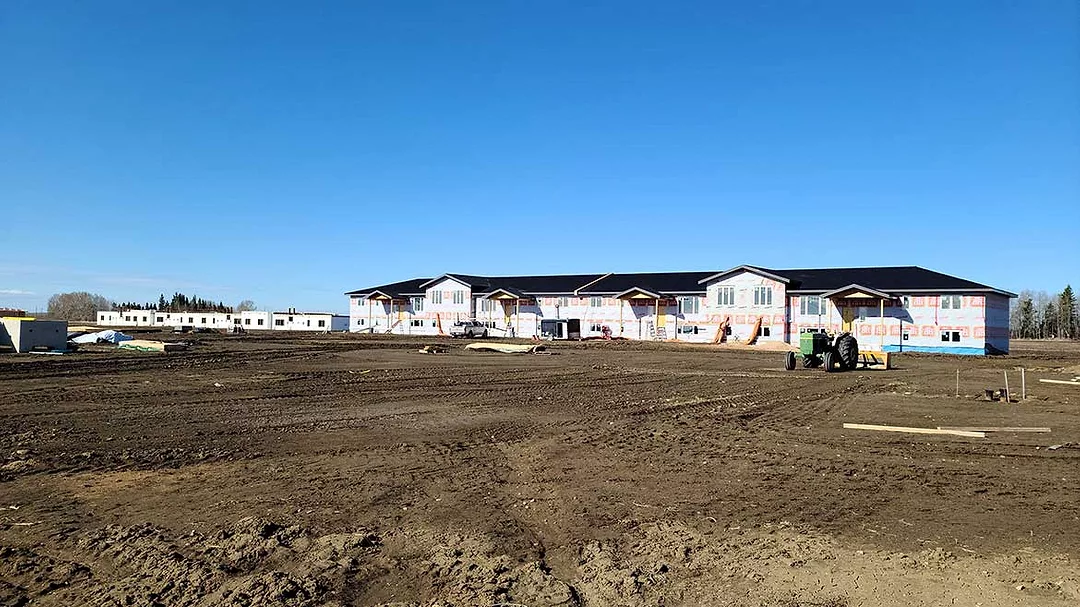
The colony’s multi-family homes under construction. Photos courtesy of AltaTech Agencies.
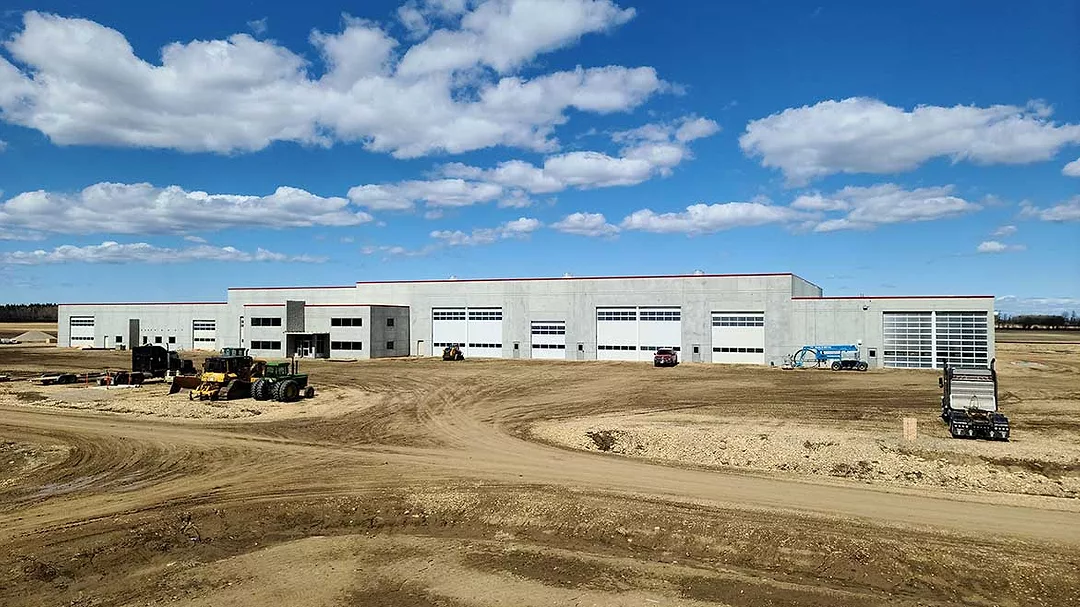
The Deep Creek Farms Colony built a 29,000 square-foot equipment shop with an adjacent 12.000 square-foot wash bay, all with in-slab hydronic heat.
Hutterites are a branch of Anabaptists, who, like the Amish and Mennonites, trace their North American roots to Europe’s Radical Reformation of the 16th century.
Hutterites have at least two major distinctions from Amish and Mennonites. They live and work in colonies, which function as a large commercial organization. Also, the first Amish and Mennonites in North America settled in the Mid-Atlantic, due the region’s climate, which resembled their homeland in central Europe.
In contrast, when most Hutterites fled Germany and Austria, they first migrated to Eastern Europe before emigrating to North America some 100 years later. They’d grown accustomed to colder climates and searched for similar conditions after crossing the Atlantic. Today, almost all Hutterites live in Western Canada and the upper Great Plains of the United States.
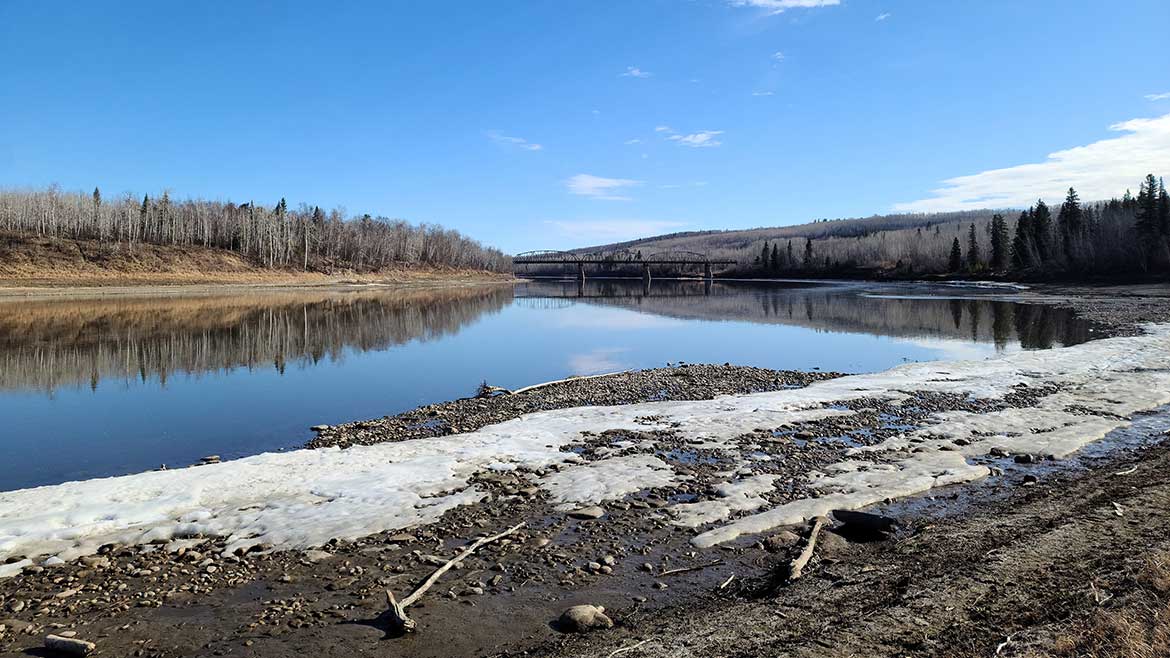
The Athabasca River
| Photo courtesy of AltaTech Agencies
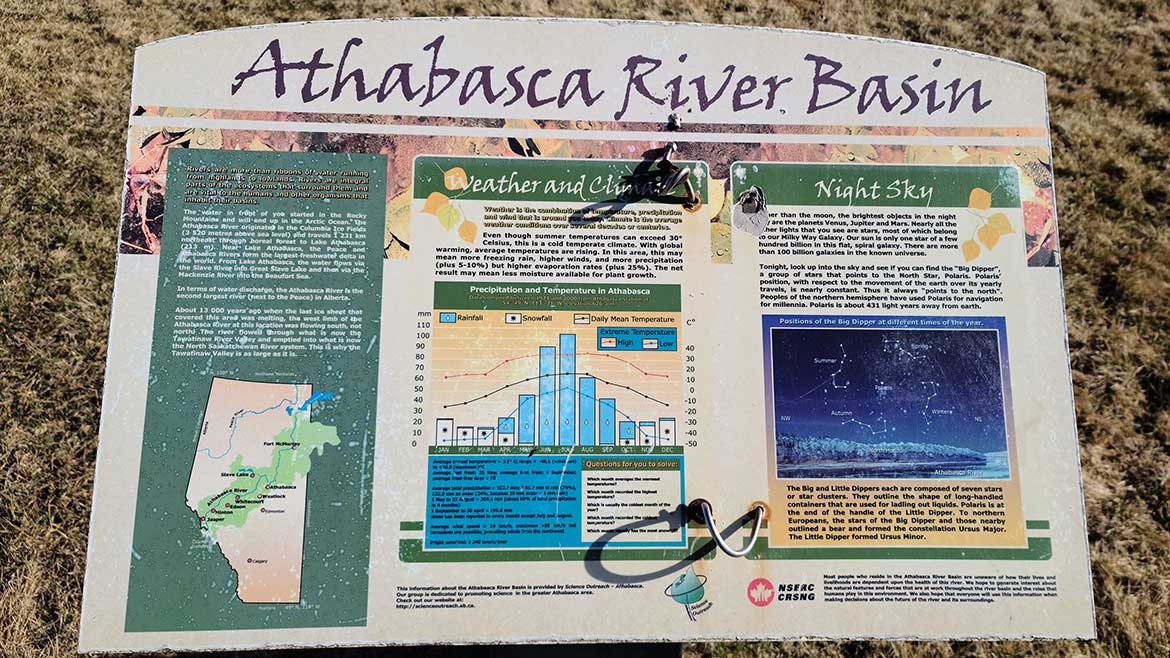
The Athabasca River Basin, in central Alberta, is home to the Deep Creek Farms Hutterite Community.
| Photo courtesy of AltaTech Agencies
Hutterite colonies generally operate large-scale farming operations. Members, many of which have mechanical backgrounds, perform their own work and value self-sufficiency above all else, whether that be food production, machinery maintenance or the building trades. Whatever a member’s specialty, rest assured that they’re meticulous, disciplined trade professionals.
Not typical customers
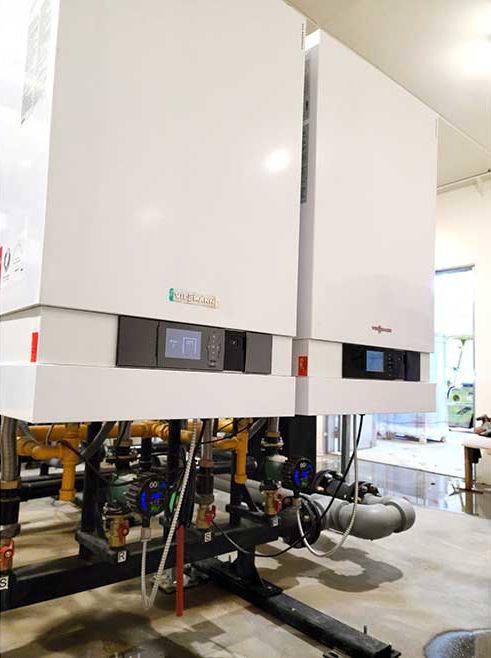
Two of the four cascaded boilers in the mechanical room of the equipment shop.
| Photo courtesy of AltaTech Agencies“While Hutterites lead simple lives by choice, it would be a mistake to label their colonies and farming operations as ‘simple,’” says Braden Davie, technical sales representative at AltaTech Agencies, in Edmonton, Alberta. “In truth, these are sophisticated commercial enterprises that are managed in great detail. While some may assume these colonies are bound to the past, Hutterite communities have their sights firmly set on the future.”
Over the years, Davie and Rob Cox, AltaTech’s owner, have developed a reputation among Alberta’s Hutterite community for providing hydronic insight, concept and leading technology. The rep firm, also with a location in Calgary, has been in business since 2005, with an emphasis on plumbing and hydronics.
Another company that’s forged a solid relationship with the Hutterite colonies in Alberta is Mulder Plumbing and Heating. The six-person company in Lethbridge specializes in hydronic troubleshooting and design.
“Our involvement with the Hutterite colonies began several years ago, when we were brought in to diagnose some issues they were having at one of their locations,” says Steve Mulder, owner of Mulder Plumbing & Heating. “These colonies have a lot of skilled manpower, so we work with them as much as they’d like us to, generally for design and technical assistance.”
“Hydronic heat is a key staple for these Hutterite communities,” explains Cox. “The colonies in Canada aggressively embraced hydronics when legislation forced them to phase out their central coal plants that used to be the focal point of their communities.”
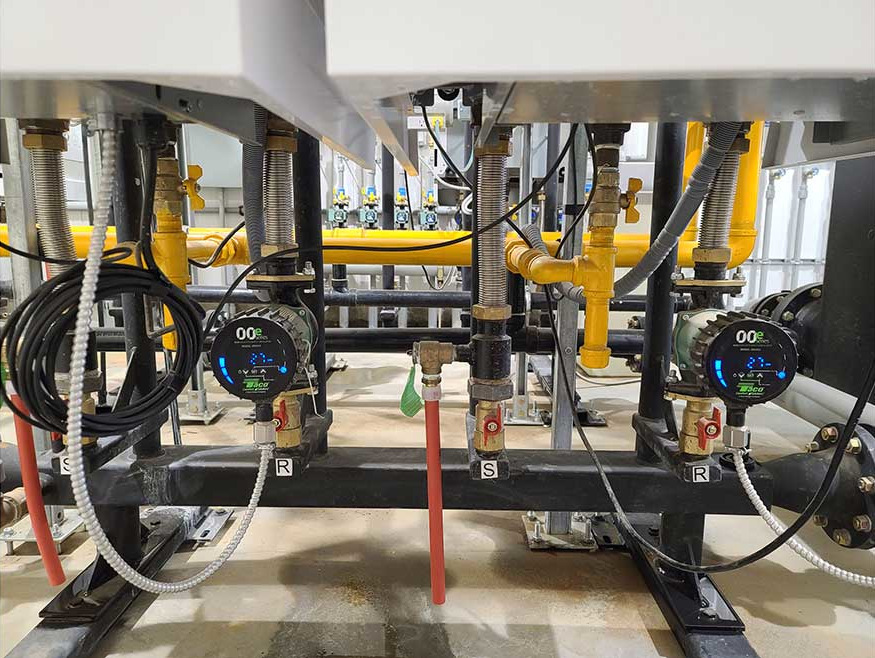
Each of the four condensing boilers has a dedicated Taco VR3452 boiler pump, which allows the installer to adjust the pump's operating point to exactly match the desired flow rate through the boiler.
| Photo courtesy of AltaTech Agencies“We’re glad to have AltaTech in central and Western Canada,” says Sean Giberson, Canadian sales manager, wholesale products at Taco Comfort Solutions. “They excel at dealing with the Hutterite colonies, and have learned that it’s not business as usual that most of us have grown accustomed to. Hutterite community members set high expectations and are meticulous and exacting in what they do. Once all their questions have been answered, you can count on a refreshing handshake to seal the deal; demonstrating their sincere belief in the word ‘integrity.’”
Unique load
Leadership at the new, 50,000-acre Deep Creek Farms colony, near Athabasca, contacted AltaTech and Mulder Plumbing & Heating to discuss several construction projects. They were building a new farm equipment shop and expanding housing for members.
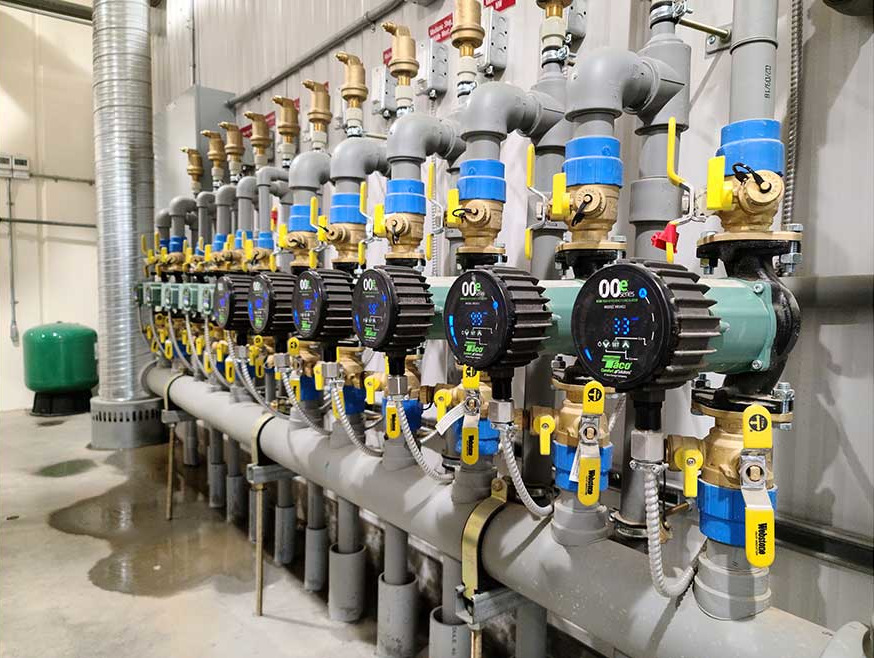
In the large shop’s mechanical room, the system-side circulators distribute low-temperature water. Each zone is programmed individually, with either a Taco VR3452 or 0018e circulator.
| Photo courtesy of AltaTech Agencies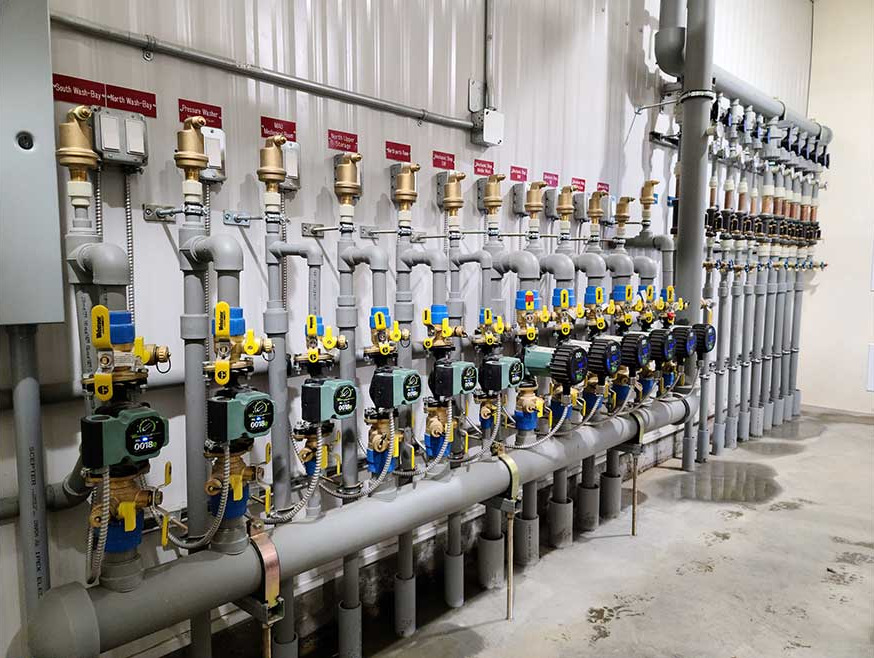
In the large shop’s mechanical room, the system-side circulators distribute low-temperature water. Each zone is programmed individually, with either a Taco VR3452 or 0018e circulator.
| Photo courtesy of AltaTech AgenciesAlberta winters are hard on expensive state-of-the-art agricultural equipment if not properly maintained, so the colony began building a new 29,000 square-foot shop with offices and storage space. Adjacent to that, a 12,000-square-foot wash bay provides the means to keep heavy equipment clean.
Deep Creek Farms planned to build the facilities themselves, but they relied on AltaTech and Mulder Plumbing and Heating for the most technical aspects of the project. AltaTech made suggestions, provided system concepts, and sourced equipment. Mulder’s design work included sizing all portions of the systems and creating drawings, in addition to completing some of the most technical installation and commissioning.
The main goal for the heating system — to be installed by the colony’s plumbing team — was that it be robust, long-lived and efficient. This included extensive in-slab heating and hot water production for the wash bay.
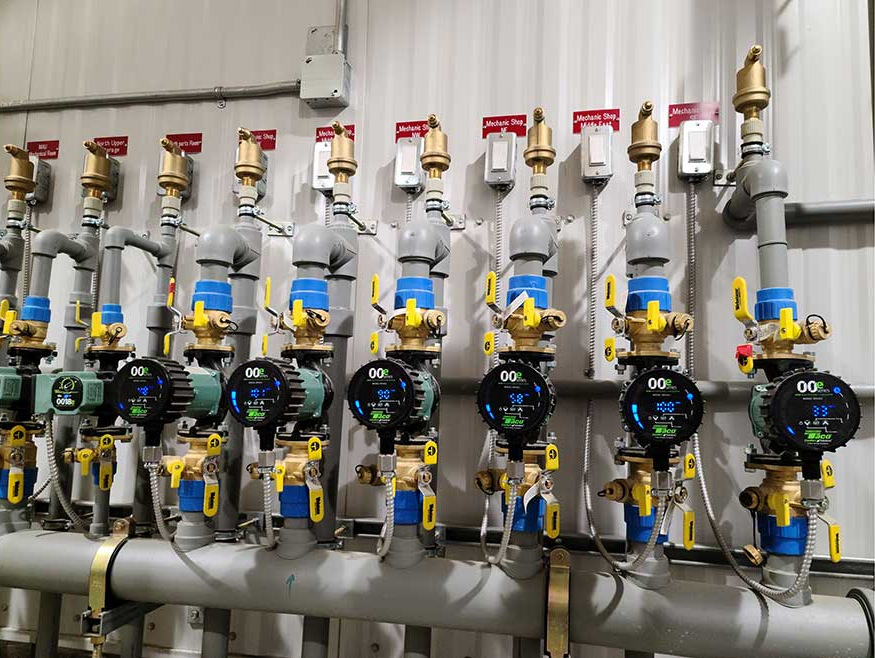
The Taco VR3452 zone circulators displaying power consumption in watts.
| Photo courtesy of AltaTech Agencies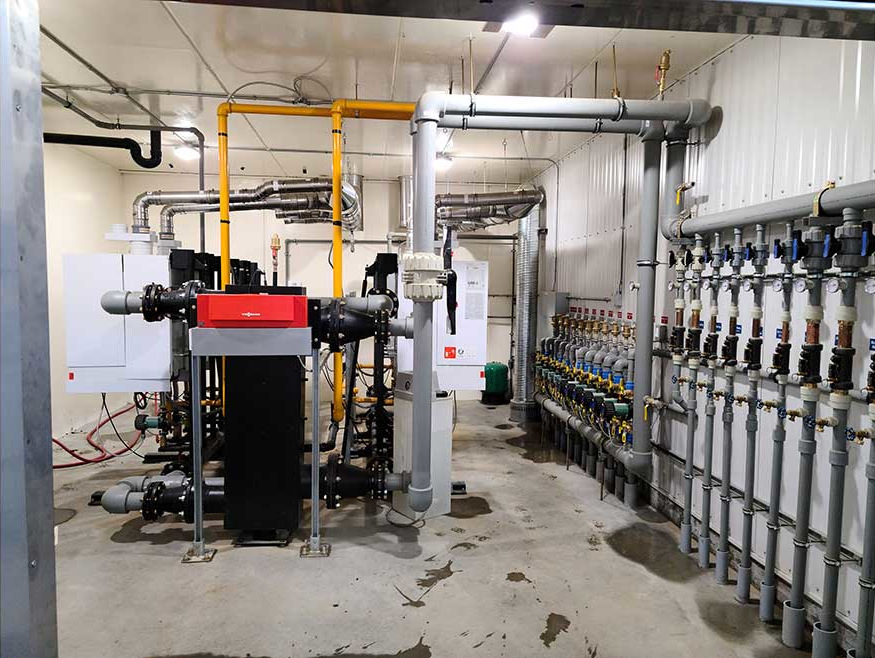
The property’s largest mechanical room features a multi-boiler cascade system mounted to the floor in the center of the room, with a collection of Taco zone pumps on the wall.
| Photo courtesy of AltaTech Agencies“One unique element considered was ensuring that the system can overcome the heat lost to the giant trucks and tractors that come in and out of this shop all winter long,” Davie says. “As these giant blocks of frigid steel machinery act as heat sinks/vacuums every time they get parked inside, we still needed to ensure comfort could be maintained for the users.”
“Basically, Mulder confirmed that the boiler plant would be capable of matching the heat load for the facilities plus the additional load of the cold equipment,” he continues. “Because these are modulating systems, we can oversize without concern of short cycling. We had conversations about how often they’re moving equipment in and out.”
Specific needs, specific pumps
The equipment maintenance bays, offices and storage areas are heated exclusively by 10 zones of in-slab radiant operating on outdoor reset. Two additional radiant zones are dedicated to the large wash bay.
In the main mechanical room, eight rack-mounted 500,000 Btu/h Viessmann condensing boilers provide all the heat and hot water needed for the facility. Each boiler is circulated to the primary loop by a Taco VR3452 ECM circulator. This pump model is also used to circulate all 12 in-floor zones.
Rather than using a hot water storage to provide adequate volume to the wash bay, stainless steel, plate-and-frame heat exchangers separate the closed boiler loop from the well water used in the wash bays.
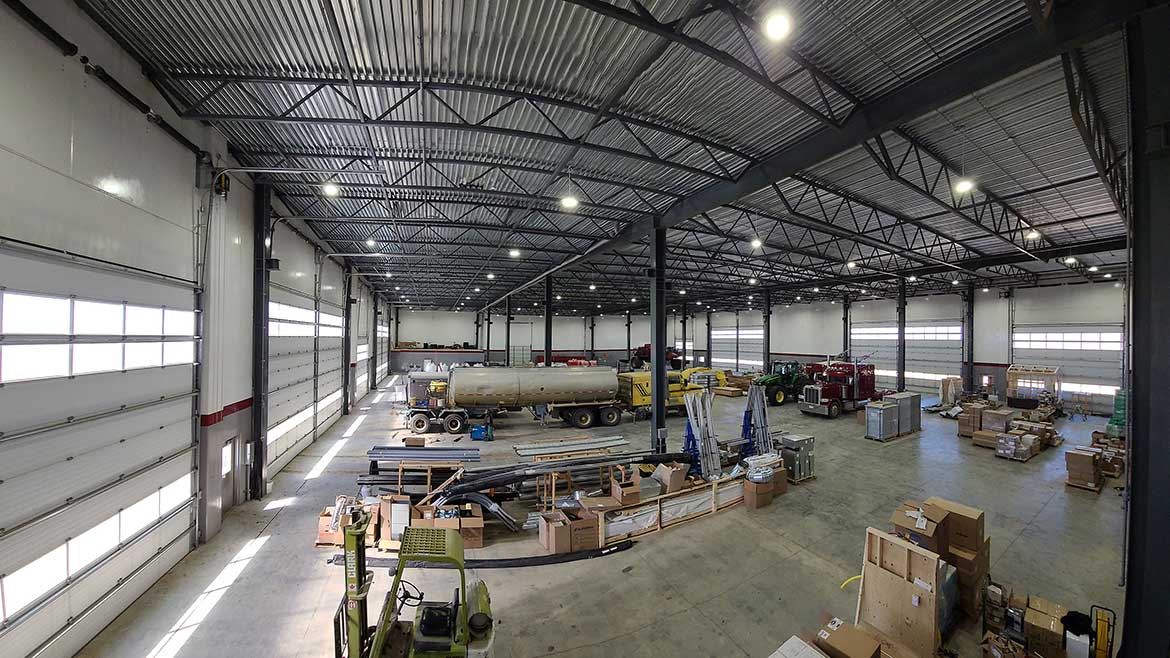
The 29,000 square-foot shop is used to store and maintain a variety of large agricultural equipment.
| Photo courtesy of AltaTech Agencies“Taco VR3452 circulators were used for the ability to dial in a specific flow rate, which is a great benefit in a cascaded boiler system like this,” Davie says. “In this manner, we can ensure that all the boilers are seeing the same flow rate and firing at the same input.”
In addition to the large ECM circulators, Taco 0018e circulators were used for zoning. Because this circulator is Bluetooth-programmable, it allowed AltaTech and Mulder to fine-tune the desired flow rate for each radiant zone via the circulator’s mobile app.
Slaughterhouse
The slaughterhouse, adjacent to the shop, provides the community with a place to render all of their meat, whether for consumption on the property or sale. This facility utilizes two of the same condensing boilers, though slightly lower in capacity, which supply heat for both heat and processing/sanitizing.
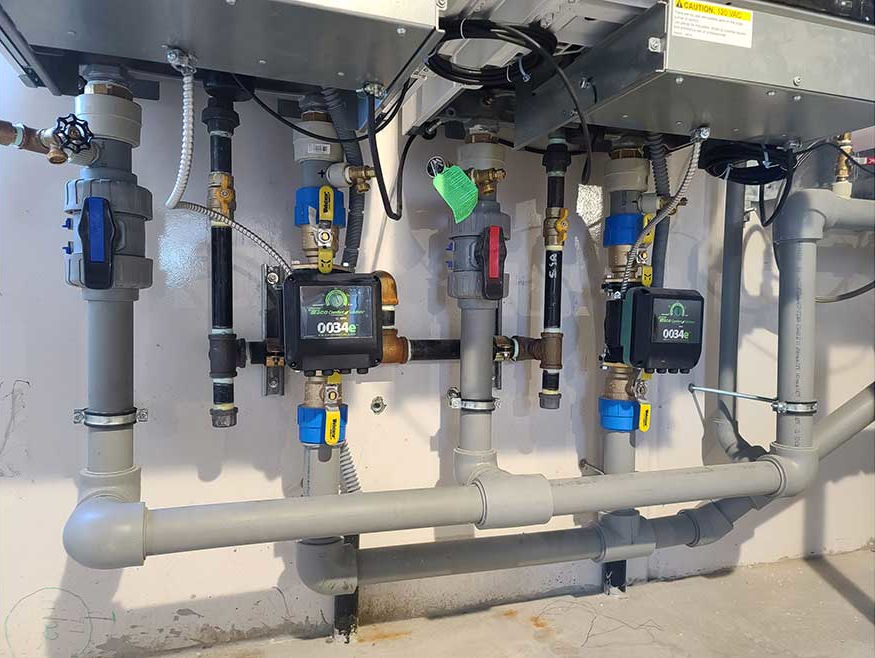
The slaughterhouse boiler system features two boilers instead of four, with Taco 0034e circulators operating as the boiler pumps.
| Photo courtesy of AltaTech Agencies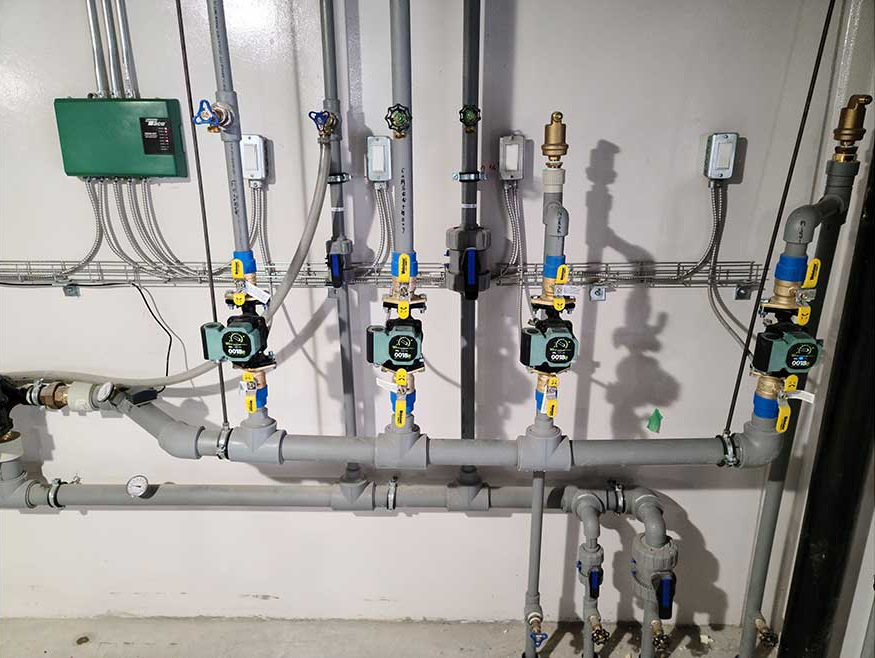
In the slaughterhouse, Taco zoning circulators were installed downstream of a mixing valve. The individual zoning thermostats call these pumps into action using a Taco Switching Relay mounted on the wall.
| Photo courtesy of AltaTech AgenciesA dual-coil, 120-gallon indirect tank supplies the process water and the installers roughed in for a second tank to be installed later if needed.
In addition to the space heat zoning in the slab, there is a slab warming zone under the large walk-in freezer. This zone, which operates via a slab sensor, is used during the summer to prohibit frost infiltration of the slab. Running this zone during the warm months guards against damage to the slab below the walk-in freezer.
The systems in both buildings use fused polypropylene pipe for all near-boiler and mechanical piping, and each loop has isolation valves for simple service. In most instances, circulators are wall-mounted remotely, instead of inside the mechanical room.
Moving forward
Once finished, each Hutterite community will accommodate up to about 100 residents. Both AltaTech and Mulder Plumbing & Heating are working with the colony on the residential side of the project. They’re in the process of designing heating systems for the housing complex, which includes multi-unit four-plex homes, each 8,000 square-foot building with its own boiler. In-floor heat and hydronic coils are both used to heat the living spaces, with DHW provided by indirect water heaters.
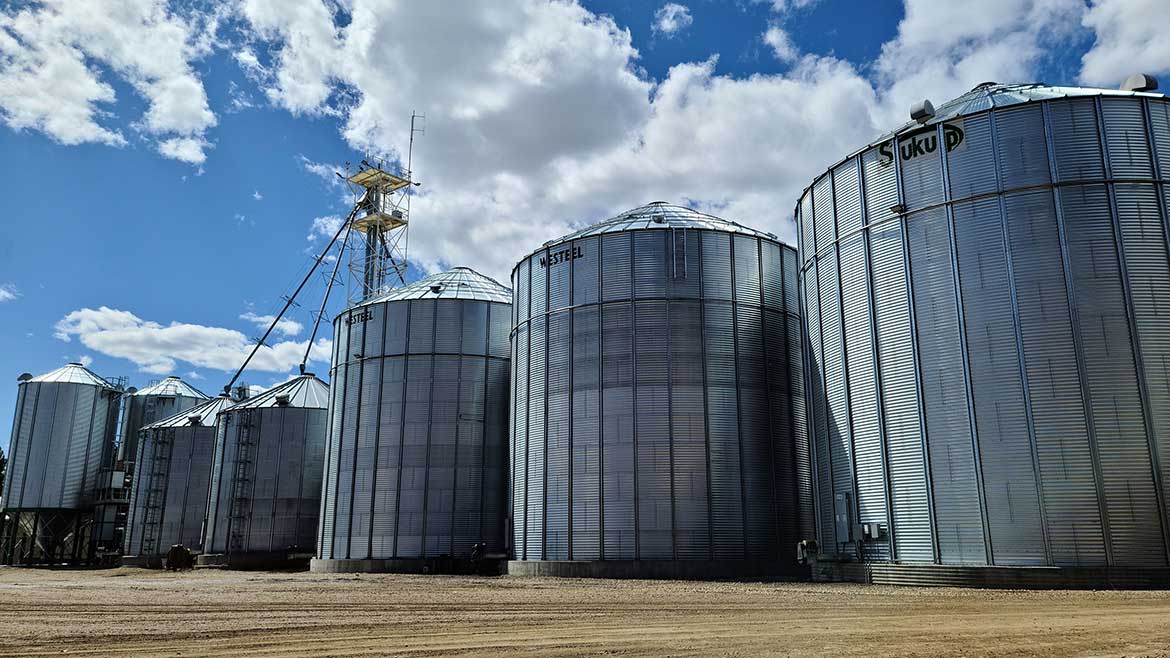
Hutterite colonies frequently operate large-scale farming operations. Here, a large grain elevator was one of the first structures completed at the new Deep Creek Farms Colony.
| Photo courtesy of AltaTech Agencies“The work at new Hutterite communities, like Deep Creek, is never completed all at once as it may be on a typical commercial site,” says Davie, who made numerous trips to the site. “As these communities perform their own work and value self-sufficiency above all else, they tend to follow the schedule of the seasons. This means that they prioritize completing the work themselves before offering it to others.”
The pace of the work was dictated by the colony’s immediate need and by each seasons’ agricultural activities. When time and circumstances permit, they return to these rooms to complete their technical HVAC work, but the seasonal, agricultural work takes precedence. This, along with the scale of the project, dictated the pace of the work for Mulder employees, who had to drive six hours from Lethbridge to the colony.
“The focus on serving the larger needs of the community first is quite unique to the culture of Hutterite Colonies and this stands in stark contrast to the demanding nature of the construction industry where we’re tied to owner schedules and profitability,” concludes Davie. “And, as they’re installing their own equipment and will be responsible for maintaining it, the Hutterites tend to value reliability, durability and service above all else.”
Looking for a reprint of this article?
From high-res PDFs to custom plaques, order your copy today!







